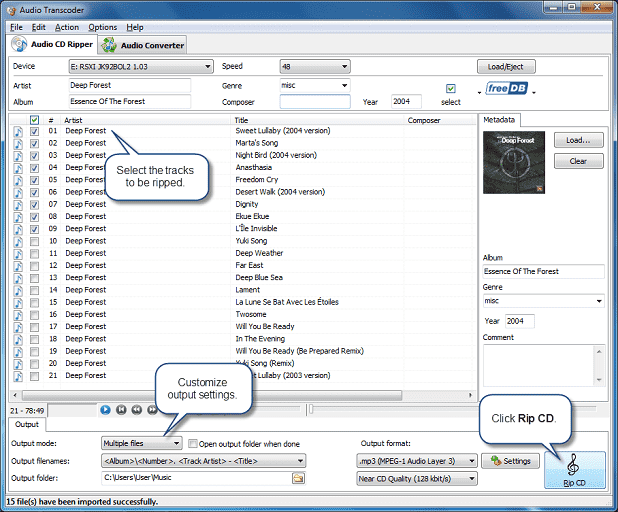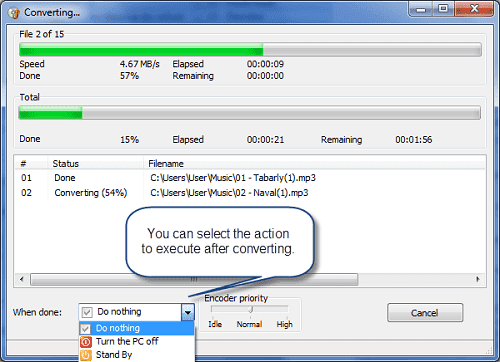
How to convert CDA to AAC? Try the Audio Transcoder!
Key features of the best CDA-to-AAC Converter & CD Ripper:
- Lightning-fast conversion (multi-core optimized encoders to speed up conversions on modern PCs.)
- Batch mode for multiple tracks conversion task at once.
- Supports most widely used popular input and output formats.
- Supports drag & drop.
- Full Unicode support for tags and file names.
- Integrated CD ripper with CDDB/freedb title database support.
- Supports conversion without any temporary files it brings you high converting speed and saves hard disk resource.
- Easy to learn and use, still offers expert options when you need them.
- Creates output folders according to source files directory tree automatically.
- It can add ID3 tag such as title, artist, album, year, genre, and comment to target file when converting CD tracks to FLAC/WMA/OGG/WAV/APE/MP4/M4A/M4B.
- Fairly intuitive to use with its Windows Explorer-Style user interface.
With CDA to AAC Converter, you can turn those .CDA files to AACs and be on your way. Our CD Ripper offers you an easy and fast way to convert CDA to AAC audio with high quality. What is .cda file? Audio CD Track or .cda file is a small (44 bytes) file generated by Microsoft Windows for each track on an audio CD (it is a virtual file that can be read by Windows software, but is not actually present on the CD). This file contains indexing information that programs can use to play or rip the disc. It is given a name in the format Track##.cda. The .cda files do not contain the actual PCM wave data, but instead tell where on the disc the track starts and stops. If the .cda file is "copied" from the CD-ROM to the computer, it becomes useless, since it is only a shortcut to part of the disc.
Free download and follow the instructions below
Steps on how to convert CDA to AAC + CUE:
1. Add an audio tracks to rip.
The first step is to select CD tracks to convert. Run Audio Transcoder and select Audio CD Ripper sheet. Then select a tracks in the Track List. Optionally, CD Ripper can set tags or download it from FreeDB.

Once tracks are selected, the next step is to select the output settings in CD Ripper.
2. Select the output settings.
The second step is to select an output settings. To begin, select a folder for output files and choose an action to be executed if an output files already exists (create a new file, overwrite or skip existing file).

Finally, you should select the output format and sound quality. In AAC dialog box, choose format settings for the final files. Depending on quality you need, select bitrate, sample rate and the number of channels. You will probably lose some audio content if you choose mono option. You can choose what sample rate you want to use. 44.1 kHz (or 44100 Hz) is a sample rate used by music CDs. Less than that and you'll start to hear the loss in quality. You can choose a bit rate you want to use (128kbps is often used for MP3s on the internet).

Once output settings are customized, you can go to the final step - transcoding.
3. Start to convert CD tracks to .aac
Click Convert button to start to transcode music into any audio format you desired. A conversion dialog will appear to show the progress of data conversion. If you want to stop process, please click Stop button. After conversion, you can click an Output Folder button to get transcoded files and transfer to your iPod, iPad, iPhone, MP3 player or hard driver.

During the ripping cd tracks into aac, you can change priority of the process or set an automatic event to be executed when the conversion is over. After the conversion has finished, you can find your converted tracks in the output folder you specified.
People often search for "cda to aac converter online" or "how to convert cda to aac online" without realizing that Audio CDs are impossible to convert (rip) to aac online. But with Audio Transcoder you can esily rip your audio CDs to AAC, FLAC or WMA for use with any your player. You can even convert whole music libraries. The CD Ripper supports the CDDB/freedb online CD database. It will automatically query song information and write it to ID3v2 or other title information tags. Have any questions regarding CDA to AAC Ripper? See below Frequently Asked Questions.
With CDA AAC Converter Ripper you can convert any CD tracks for all iOS devices and play audio on your iPod, iPhone or iPad.
- Convert CDA > AIFF
- Convert CDA > FLAC
- Convert CDA > ALAC
- Convert CDA > M4R
- Convert CDA > APE
- Convert CDA > M4B
- Convert CDA > M4A
- Convert CDA > MP2
- Convert CDA > MPC
- Convert CDA > OGG
- Convert CDA > SPX
- Convert CDA > WMA
- Convert CDA > MP4
- Convert CDA > WAV
- Convert CDA > MP3
- Convert CDA > AC3
Software System Requirements:
-
Minimum
- Microsoft Windows XP (32-bit and 64-bit)
- 1.0 GHz or faster processor
- 512 MB RAM
- 10 MB free hard drive space
-
Recommended
- Microsoft Windows 7/8/8.1/10 (32-bit and 64-bit)
- Pentium 4 or faster multi-core processor
- 1 GB RAM
- 10 MB free hard drive space
Frequently Asked Questions
We strongly recommend that you first find answers to your questions here before try to contact us.
Q: What is CDA ?
A: Compact Disc Digital Audio. A file with the extension .cda is a small (44 byte) virtual file generated by Microsoft Windows for each audio track on a standard "Red Book" CD-DA format audio CD as defined by the Table of Contents (ToC) (within the lead-in's subcode). These files are shown in the directory for the CD being viewed in the format Track##.cda, where ## is the number of each individual track. The .cda files do not contain the actual PCM sound wave data, but instead tell where on the disc each track starts and stops. If the file is "copied" from the CD to a computer, it cannot be used on its own because it is only a shortcut to part of the disc. However, some audio editing and CD creation programs will, from the user's perspective, load .cda files as though they are actual audio data files, and allow the user to listen to them. This should not be confused with the tracks actually containing the audio data on the CD.
Back to top
Q: What is AAC ?
A: Advanced Audio Coding (AAC) is an audio coding standard for lossy digital audio compression. Designed to be the successor of the MP3 format, AAC generally achieves better sound quality than MP3 at similar bit rates. AAC has been standardized by ISO and IEC, as part of the MPEG-2 and MPEG-4 specifications.
Back to top
A: Please contact us.
Back to top







